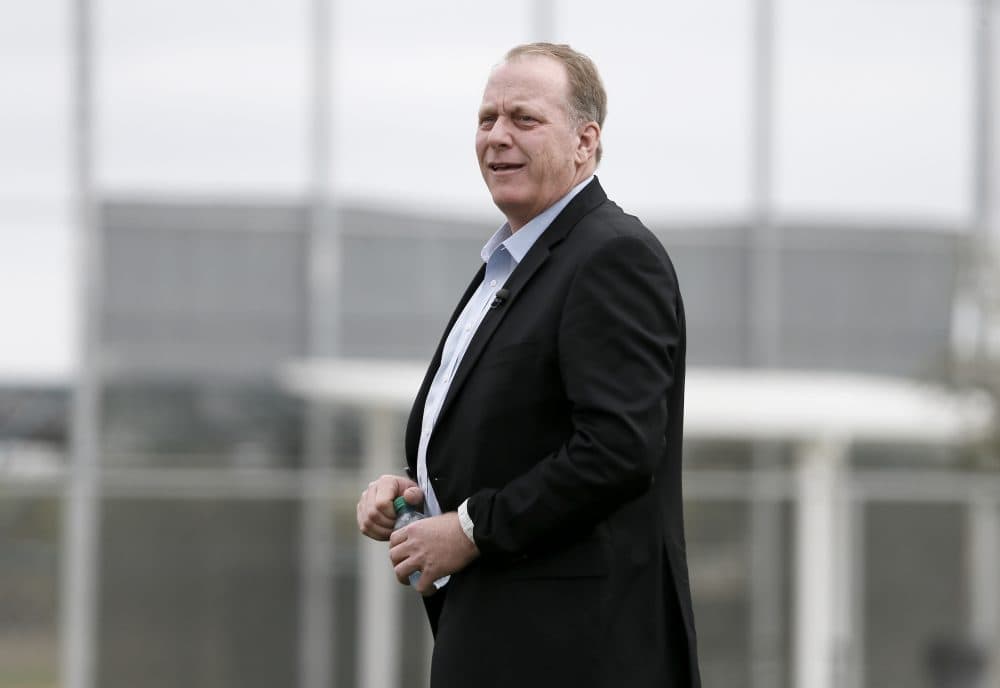Advertisement
The Trump Party's First Candidate: Curt Schilling

If the GOP pulls the plug on his campaign and Donald Trump loses in November, we shouldn’t worry what will become of him. Believe me, he has a nice apartment, model wife and huge business empire to go back to.
It’s his voters who will be left in the lurch — emphasis on his. Republican voters who supported Trump out of obligation might be fine waiting for the second coming of Ted Cruz in 2020. But true Trump supporters, the ones he dug up and wound up all on his own, have nothing to fall back on.
Elsewhere in the world, charismatic leaders spurned by the establishment often form their own party. Hugo Chavez founded his Fifth Republic Movement because he felt Venezuela’s electoral system was rigged. Turkey’s Recep Erdoğan formed the Justice and Development party after serving time for inciting violence and religious hatred. Is the dawn of a viable third party in American politics finally here?
Is the dawn of a viable third party in American politics finally here?
If so, it appears the Trump Party (which, of course, would bear that great Trump brand) has its first down-ballot candidate: No. 38, Curt Schilling. The former Red Sox pitcher called into WRKO’s The Kuhner Report last week and hinted he might oppose U.S. Sen. Elizabeth Warren, a Democrat, in her presumed 2018 reelection bid. His interview, along with a follow-up appearance, helped sort out what aspects of Trump’s unique campaign might last beyond November.
It should come as no shock that, like most third parties, the Trump Party will be the outsider, anti-establishment party. Schilling echoed this by telling Kuhner on Monday that “both parties are a mess,” before emphasizing Wednesday that he was “untethered from a political perspective.” This will define the party perhaps more than ideology, as evident in Trump’s failed attempt to collect disenchanted Bernie Sanders supporters after their candidate endorsed Hillary Clinton.
It’s not uncommon for opposition parties to sound a negative tone as a rallying cry for change. We can expect that the Trump Party will continue the pessimistic view of America’s status quo inherent in his “Make America Great Again” slogan. One commentator noted Trump’s acceptance speech at the GOP convention should have used Simon and Garfunkel’s “Hello, Darkness” as a theme. The same could be said of Schilling’s comments on Monday, which began with exasperated musing that we might not survive four years to see how the GOP strategy plays out.
The Trump Party will favor leadership over political experience. Donald Trump cites his business success as proof he can lead the country; on WRKO, Schilling noted the experience he has making difficult decisions under pressure and leading teams in doing the impossible. “Every single public servant,” he went on to explain Wednesday, “at some time wasn’t.”
Low-information voters will form the base of the Trump Party’s support. While both major parties consider this label pejorative, Schilling seemed to reclaim it as a badge of honor, reflecting the Trump Party’s distrust of the sources of information. To him, a low-information voter is one whose minds haven’t been spoiled by the corrupt media.
Their unique relationship with facts and truth will be the Trump Party’s defining characteristic. We can expect the party will do nothing to correct supporters who react positively to their dog-whistle comments, but quickly dismiss criticism by characterizing objectionable comments as taken out of context, misunderstood, or jokes the media didn’t get.
When pressed, Schilling offered one criticism of Trump: He’s not as funny as he thinks he is. Schilling went on to defend comments Trump made about Sen. John McCain (saying he prefers “people who weren't captured”), and how Second Amendment supporters can stop Clinton, as bad jokes. This jives with Trump’s assertion that his comments that President Obama founded ISIS were sarcastic. Or maybe not.
Similarly, both Schilling and Trump use social media to wink at bigoted groups without saying anything. Trump famously retweeted comments from white supremacists, including one from a user with “white genocide” in his name. Last year, Schilling was suspended from his job as an ESPN commentator for retweeting a meme comparing Muslim jihad to Nazism. This year, ESPN fired Schilling for reposting a transphobic meme on Facebook. Both men did not author the controversial materials, a distinction whose difference was lost on most Americans. It’s worth noting that Schilling apologized for the first one (initially anyway, he made no such apology on the air Wednesday).
Schilling’s interviews indicate the Trump Party might be more reasoned and principled than its namesake. Schilling outlined his fundamental positions cogently and with seemingly genuine conviction. He’s pro-life, pro-guns, “all about immigration reform” and a constitutional conservative.
He also made some comments that would be unimaginable coming from Candidate Trump. As CEO, Schilling claimed responsibility for the 38 Studios debacle. Though baited by the host, Schilling didn’t call for Sen. Warren to take a DNA test and prove “once and for all” if she is part Cherokee on air. He even said on Sunday that calling Warren a nightmare on the radio “wasn’t appropriate.”
Both Schilling and Trump use social media to wink at bigoted groups without saying anything.
But then again, maybe not. Sunday’s blog post reversed these positions. Schilling posted his results from a DNA test showing his ancestry and wondered why Warren hadn’t done the same. He used seven times as many words to blame Rhode Island, particularly then-Gov. Lincoln Chafee, than he did accepting his own fault.
Perhaps most telling: After saying the “nightmare” comment was inappropriate, Schilling noted: “I am in no way shape or form going to run with a list of do’s and do nots from a speech perspective.” That sure sounds like the party line.
When the obituary of Trump’s campaign is penned for the last time, pundits will be scrambling to articulate the lasting impact it will have on America’s political landscape. This week, Schilling gave us a sneak peek of what’s next -- and both parties ample opportunity to prepare for next time.
